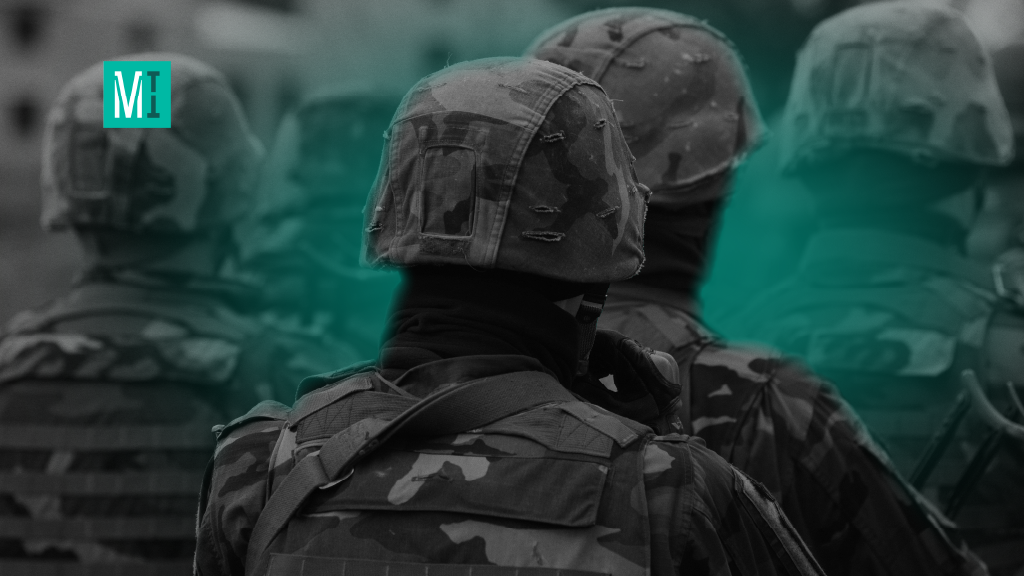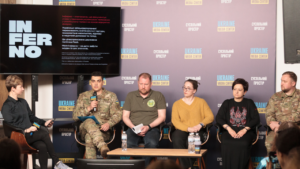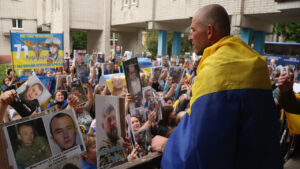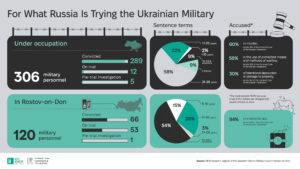The first captives on February 24: how it happened. Stories of Ukrainian soldiers

On the morning of February 24, the day of Russia’s full-scale invasion of Ukraine, Russian President Vladimir Putin announced a special military operation in Donbas. Shortly afterwards, the entire territory of Ukraine was hit with a massive missile attack, followed by a land offensive launched from the territories of the occupied districts of Donetsk and Luhansk Regions, Crimea, Belarus, and the Russian Federation.
On the opening day of the big war, over 300 soldiers from the Ukrainian Armed Forces, National Guard, and border guards were taken prisoner, and the majority of them are still incarcerated.
“We will change the government in three days, and you will be released”
Ukrainian border guards were among the first of those who came face to face with the Russian onslaught.

In his Telegram channel, Journalist Andriy Tsaplienko published a list of border crossing points attacked by the Russian army on February 24, 2022
In the early hours of February 24, the Bachivsk border crossing point in Sumy Region was operating without incident. However, everything changed drastically when a convoy of Russian military vehicles launched an aggressive attack across the border at 4 a.m., using heavy weaponry to target the checkpoint and surrounding population centers.
One of the border guards, whose name is being withheld for security reasons, vividly remembers the daunting moment: “They outnumbered us by a significant margin. They had 150 armed soldiers, while we were only 26. They threatened to shoot us all if we refused to surrender our weapons.” He was captured along with everyone else at the checkpoint that same day. Even civilians traveling to Russia or returning to Ukraine were taken prisoner, searched, stripped of their phones, and escorted at gunpoint to a neighboring checkpoint across the border.
Captured border guards at the Bachivsk border crossing point on February 24, 2022
After being separated from customs officers and civilians, the border guards were interrogated by various unmarked representatives of intelligence services, some of whom were plain-clothed. There were also Russian journalists on a mission to film a story about Ukrainian border guards voluntarily surrendering weapons and crossing into Russia.
“We rejected their request for an interview. We told them: ‘You demolished our entire border crossing point. What kind of interview are you talking about?’,” a formerly captive border guard says.
At first, the Russians didn’t know what to do with the prisoners, insisting that they were not prisoners of war. The Ukrainian border guards were kept in an observation room and slept on pallets, but were treated humanely. The Russians remained optimistic, believing that the situation would soon resolve and the “two fraternal peoples” would once again live in harmony.
“When they captured us, they told us not to worry, that they would interrogate us, and in a few days the government in Kyiv would be changed and we would go home. They really believed it,” recalls the border guard.
A bus arrived from Ukraine two days later, which allowed for the release of civilians and customs officers, but 26 border guards and four radio reconnaissance soldiers remained in captivity.
Russian propaganda about “three days” proved to be false as the captured border guards were held at a Russian customs office for five more days. Their subsequent journey home to Ukraine was difficult and painful. However, 11 border guards from the Bachivsk border crossing point have remained in captivity for a year now.
“Paratroopers landed on our heads”
The Antonov airport near the town of Hostomel was a prime target of the Russian offensive in the early hours of the war. At approximately 7 a.m., a cruise missile struck Military Unit 3018 of the National Guard of Ukraine, causing damage to a nearby building. Within hours, a group of Russian Ka-52 helicopters and MI-8 assault transports headed in the direction of the airport, and enemy paratroopers began to land in the area.
“We found ourselves completely surrounded. Our group consisted of 12 border guards and National Guard soldiers, and there were also civilians present on the airport grounds,” recounts Andriy, a border guard whose name has been altered to protect his identity.

Fighting for the Hostomel airport. Photo courtesy of Forbes.ua
According to the man, the Russians released the civilians on the same day, but the captured border guards and soldiers were first locked in a bomb shelter under the canteen, and then moved to large cold-storage rooms in the same building.
“We were given one Russian dry ration for ten people per day, 50 grams of water per person. On the first day, it was okay, but on the third day, they gave us much less,” the former captive recalls.
The Ukrainian prisoners were held at the Hostomel airport with their hands tied and in complete darkness until March 7, after which they were transported to Russia through Belarus.
“In March-April 2022, prisoner-of-war exchanges took place, and all the personnel of the Hostomel Border Guard Department at the Kyiv detached checkpoint, who were captured on February 24 at the Antonov airport, were able to return home, except for my brother,” said the sister of one of the captured border guards in October 2022 during an interview with the Media Initiative for Human Rights.
After nearly a year of captivity, the man was finally exchanged on February 4, 2023. Unfortunately, members of the National Guard of Ukraine from Military Unit 3018 are still being held captive.
Capture of the Chornobyl Nuclear Power Plant
Russian troops entered the territory of the Chornobyl nuclear power plant from Belarus, prompting soldiers from the 1st Detached Battalion for the Protection of Critical State Facilities of the National Guard of Ukraine (Military Unit 3041) to attempt to repel the enemy attack. Despite their efforts, by the end of the day, the Ukrainian authorities reported that they had lost control of Pripyat and Chernobyl.
Reuters reported shortly afterwards that 169 National Guard fighters surrendered their weapons without a fight.

On March 31, the Russian troops left the Chornobyl zone, taking all prisoners with them.

Statement by the Ministry of Internal Affairs about the captive National Guard fighters
Throughout the occupation of Chornobyl, civilians and plant workers also remained on the power plant grounds and were unable to leave until March 20.

Chornobyl Nuclear Power Plant workers spent over 600 hours in their workplaces as hostages to the Russian troops.
On January 8, 2023, eleven servicemen captured at the Chornobyl NPP returned home, and a total of 27 National Guard fighters of Military Unit 3041 had been exchanged. 141 more National Guard soldiers are still in captivity.
Chonhar Border Crossing Checkpoint
Kherson Region was overrun swiftly. The Russians stormed simultaneously all three border crossing points on the isthmus with Crimea: Chonhar, Kalanchak, and Chaplynka.

This was the first tweet on the Internet about the Russian offensive from Crimea.
Around 9 a.m., the State Border Service published a short video from the Chonhar Border Crossing Point showing Russian military vehicles entering Ukraine.
What occurred at the checkpoint itself remains uncertain. In an interview with the MIHR, the mother of one of the captured border guards revealed that her son was on duty the night of February 23-24, and that she later discovered he had been taken prisoner. His comrades-in-arms contacted her and informed her that they were first held in Crimea before being transferred to Russia.
Russian media outlets reported that the border guards from the Chonhar checkpoint, who had been captured in late February 2022 and returned home on April 1 as part of an 86-for-86 exchange, had been captured again. However, as of now, the MIHR has not been able to confirm the veracity of these reports.

Russian media outlets reported that Ukrainian servicemen had been captured again.
“Russian warship, go f**k yourself”
Ukrainians watched with bated breath as the defense of Zmiyiny Island unfolded, and the world-famous phrase telling the Russian warship what it should do has become a symbol of the Ukrainian people’s struggle.
On February 24, intense fighting erupted after the enemy landed on Zmiyiny Island. Throughout the day, relatives of the defenders remained in contact with the military. However, after air strikes demolished the island’s infrastructure, communication with Ukrainian forces was lost.
That’s why nobody could hold back tears when the Ukrainian authorities reported that all 13 border guards who valiantly defended the island had perished.
“Anything but captivity”: most soldiers from Zmiyiny Island are in Russia and occupied Crimea
It later transpired that in addition to the border guards, approximately 80 soldiers from the 35th Detached Marine Brigade, named after Rear Admiral Mykhailo Ostrohradsky, were also captured on the island.
“After learning that 13 border guards had been killed, I couldn’t understand why the marines involved in the conflict weren’t being mentioned. So I immediately began posting on social media to gather information about their situation. Through the comments, we were able to locate all relatives of the marines,” recounts Kateryna, wife of one of the marines.
Ten servicemen were released through exchanges, while the others have been in enemy captivity for a year now.
Russian soldiers were also captured on the first day of the full-scale offensive, as evidenced by the capture of two soldiers from the 91701 Yampol detached motorized brigade by members of the 93rd separate mechanized regiment Kholodny Yar. Valeriy Zaluzhny reported this on his Facebook page. The Russian side denied these allegations.

Russian soldiers captured on February 24, 2022
The first official exchange between Ukraine and Russia took place on March 1, 2022, when 5 fighters of the Sumy Territorial Defense were returned in exchange for one Russian military police officer.
The prisoner exchanges between Ukraine and Russia were halted from June to September 2022, but on September 21, one of the largest exchanges took place. A total of 215 people, including ten foreigners who had been sentenced to death by the so-called Donetsk People’s Republic and 108 soldiers of the Azov regiment, were released from Russian captivity.
On October 16, 2022, only women were released: 108 Ukrainian women returned home, including 12 civilians, two of whom had been held hostage before Russia’s full-scale invasion.
Ukraine has brought back home a total of 1,883 military personnel and civilians since this phase of the war began.








